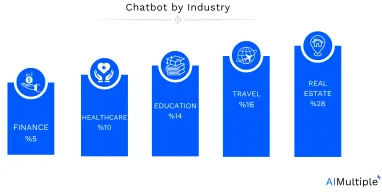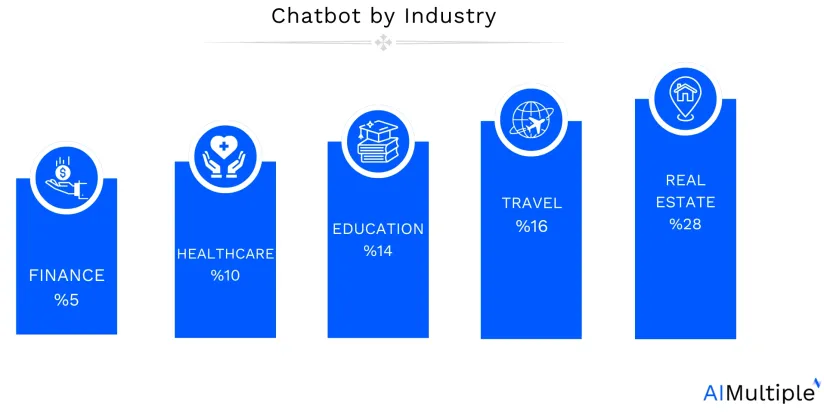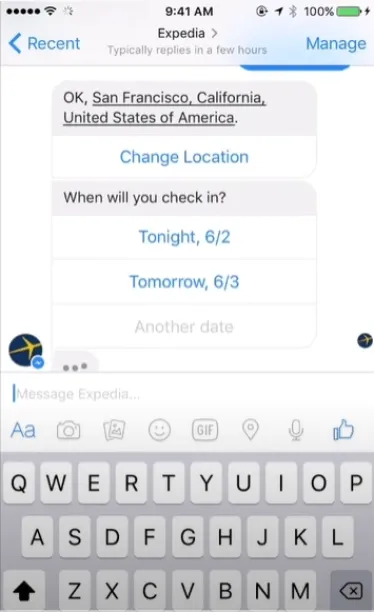Travel Chatbots in 2024: Top 8 Use Cases, Examples & Benefits


A survey has shown that 87 % of users would interact with a travel chatbot if it could save them time and money.
Chatbots act as personal travel assistants to help customers browse flights and hotels, provide budget-based options for travel, and introduce packages and campaigns according to consumers’ travel behavior. That is why travel is indicated as one of the top 5 industries for chatbot applications.
In this article we discuss the benefits and top 8 use cases of chatbots in the travel industry.
Sponsored:
Salesforce is the CRM market leader and Salesforce Contact Genie enables multi-channel live chat supported by AI-driven assistants. Salesforce Contact Center enables workflow automation for many branches of the CRM and especially for the customer service operations by leveraging chatbot and conversational AI technologies.
Chatbot benefits in the travel industry
According to a research article, the following features make chatbots useful to the travel industry:
1. Empathy:
Friendly chatbots ensure a better customer experience, thus creating better opportunities for businesses to generate leads through chatbots. For example, a chatbot utilized by GRT Hotels & Resorts exchanged over 175,000 messages within 2.5 months of its launch. This resulted in:
- 84% of those who interacted with the bot sharing their contact details,
- And 40% of them having booking intent.
2. Responsiveness:
- Chatbots provide instant response 24/7, across different communication channels, with the ability to hand over conversations to a live agent if needed.
- Real time responses are an important benefit because ±50% of customers expect businesses to be available 24/7.
- Real time answers are not valuable if they do not answer your question. Understanding and recognizing users’ intent is the key to delivering the right response. In addition, chatbots that understand and use human humor are ranked more likable, cooperative, capable, and they provide better solutions and performance than those that do not understand it.
3. Reliability:
The reliability of a chatbot is directly linked to its ability to provide the correct response within a conversation.
- Reliability depends heavily on the chatbot’s natural language understanding capabilities and data on which it is trained.
- Having an up-to-date training dataset about travel prices, destinations, packages, and comparisons, ensures travel chatbot reliability.
These features are positively associated with user’s post-use satisfaction and continuity to use the services provided.
Top 8 chatbot use cases in travel
Chatbots can provide 24/7 service in multiple languages and answer multiple customers at the same time, making them a great candidate for handling the following scenarios:
1. Search for booking opportunities
Via different communication channels (e.g. WhatsApp, Slack, Facebook messenger), users can type in requests about their destination and travel dates, and give the chatbot specific criteria (such as, non-smoking rooms, all-inclusivity, etc.) to browse options and provide it to the user throughout the conversation.
Chatbots can also ask users questions to narrow down their options, such as “What is your budget?”, “How many will be traveling?”, or “Are your dates flexible?”.
For example, Expedia offers a Facebook messenger chatbot to enable users to browse hotels around the world and check availability during specific periods.

2. Manage inquiries
Before making a final decision about travel plans, users may have questions about travel insurance, travel requirements and restrictions, estimated road tolls, etc. Chatbots can answer FAQs, and handle these inquiries without needing a live agent to be involved.
Timely and correct responses are especially important during the COVID-19 outbreak, when travel guidelines between the countries can change daily.
3. Complete reservations
When users decide upon the details of a travel plan, such as a flight or a hotel, the chatbot can inquire about user information, ID or passport data, and number of children accompanying the traveller.
The chatbot can also provide a payment gateway for the traveller to make the payment, thus finalizing their reservations and receiving an electronic itinerary. also provides a channel to complete payments via credit cards, finalizes the reservations, and sends itinerary via email or message.
4. Cross-sell
AI-enabled chatbots can understand users’ behavior and generate cross-selling opportunities by offering them flight + hotel packages, car rental options, discounts on tours and other similar activities. They can also recommend and provide coupons for restaurants or cafes which the travel agency has deals with.
This is beneficial not only for companies but also for users. For example, not all visitors know about the hidden gems (and sometimes even important sights) in the places they visit. Offering a tour of Stromboli to visitors to Sicily could help them not miss a famous point of interest close to the islands.
5. Manage booking
Users can chat with a chatbot to manage the details of their booking, such as:
- Arranging for a wheelchair.
- Changing check-in dates.
- Choosing flight seats.
- Online check-ins.
6. Manage cancellations
Chatbots can facilitate reservation cancellations without hand-overs to live agents. The chatbot will ask for the customer’s information and reservation codes or passenger name record (PNR), and it then can cancel the user’s reservations, recommend substitutions for canceled flights or hotels, provide information about refund and return policies, and create claims for those refunds.
7. Manage luggage inquiries
Chatbots typically have access to live data from airports or departure stations. Therefore, upon arrival at the destination location, travellers can ask the chatbots to learn where the luggage claim area is, or on which carousel the baggage will be on.
And in case of lost baggage, chatbots can create a luggage claim from the user’s information and ticket PNR.
8. Collect customer reviews
Conversations are a friendly way to seamlessly collect customer reviews and feedback to surveys. After completing a reservation or a service, the chatbot can ask the users some questions about their experience such as, “From 1-10, how satisfied are you with this travel agency’s services?” or “Would you recommend this agency to a friend?”, or ask them to write a comment about how the services can be enhanced.
Future of travel chatbots
Chatbot statistics suggest that users are getting more comfortable with chatbots which will lead to rising popularity among different industries. For example:
- >30% of consumers are enthusiastic about chatbots.
- 35% of consumers want to see more companies using chatbots.
- 80% of consumers who have engaged with a chatbot report it as a positive customer experience.
Additionally, global brands such as Expedia, Booking.com, and Skyscanner have adopted (conversational commerce) chatbots to process booking, recommend travel plans, and provide promotions and campaigns to current and potential users. This adoption will encourage medium and small size travel agencies to consider chatbots as a way to increase customer satisfaction.
On the other hand, millions of dollars are being spent to fund companies who offer platforms for travel chatbots and virtual assistants, such as:
- HipMunk, travel chatbot platform acquired by Concur, received ±$55M in 2016.
- Mezi, AI-enabled travel assistant chatbot acquired by American Express, received a funding of ±$11.8M in 2016.
- TravelFlan, travel chatbot provider, received ±$7M funding in 2019.
These funds are utilized to launch new chatbots on different platforms, improve chatbot intent recognition capabilities, and tackle chatbot challenges with that evidently cause chatbot fails.
To learn more future of conversational AI/chatbots, feel free to read our article Top 5 Expectations Concerning the Future of Conversational AI.
For more on chatbots
Chabots are not the only technology used in the travel and hospitality sectors. Read more about:
To learn more about chatbots, feel free to explore our in-depth articles about conversational AI and the different types of chatbots which, are rule based or AI-based.
You can also explore chatbot applications in other industries such as:
- Banking and finance.
- SAP and ERP.
- Healthcare.
If you still have any questions about conversational AI and chatbots, don’t hesitate to download our
And if you are ready to invest in an off-the-shelf conversational AI solution, make sure to check our data-driven lists of chatbot platforms and voice bot vendors.
We can also guide you through the process:
This article was drafted by former AIMultiple industry analyst Alamira Jouman Hajjar.

Cem has been the principal analyst at AIMultiple since 2017. AIMultiple informs hundreds of thousands of businesses (as per similarWeb) including 60% of Fortune 500 every month.
Cem's work has been cited by leading global publications including Business Insider, Forbes, Washington Post, global firms like Deloitte, HPE, NGOs like World Economic Forum and supranational organizations like European Commission. You can see more reputable companies and media that referenced AIMultiple.
Throughout his career, Cem served as a tech consultant, tech buyer and tech entrepreneur. He advised businesses on their enterprise software, automation, cloud, AI / ML and other technology related decisions at McKinsey & Company and Altman Solon for more than a decade. He also published a McKinsey report on digitalization.
He led technology strategy and procurement of a telco while reporting to the CEO. He has also led commercial growth of deep tech company Hypatos that reached a 7 digit annual recurring revenue and a 9 digit valuation from 0 within 2 years. Cem's work in Hypatos was covered by leading technology publications like TechCrunch and Business Insider.
Cem regularly speaks at international technology conferences. He graduated from Bogazici University as a computer engineer and holds an MBA from Columbia Business School.
To stay up-to-date on B2B tech & accelerate your enterprise:
Follow on

Comments
Your email address will not be published. All fields are required.